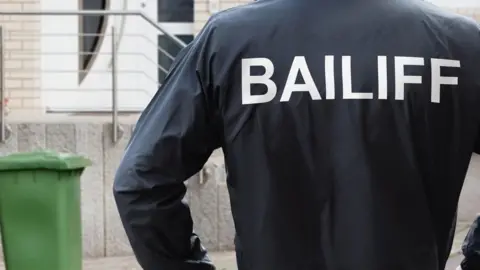Bailiff use plea after 17,000 referrals in one year
 Getty Images
Getty ImagesA charity has urged a city's council bosses to cut down on using bailiffs for debt collection, after more than 17,000 referrals in one year.
Newcastle City Council referred 17,494 debts to bailiffs in 2022-23 – more than any other council in the North East.
National Debtline, a free debt advice service, has written to the city council's Labour leader, Nick Kemp, and asked the authority to make a "clear public commitment to reduce the use of bailiffs over time", describing their deployment as "distressing" for those in financial difficulty.
The council said it strove "to treat people with fairness" and was committed to "tackling poverty" and helping those who are "genuinely struggling".
Bailiffs have the right to visit a property to collect money owed, and can remove and sell goods to repay certain debts - including council tax arrears and parking penalty charge notices, the Local Democracy Reporting Service said.
Referrals to bailiffs in England and Wales to recover unpaid council debts have risen by nearly 20%, a BBC investigation revealed in February.
National Debtline said that 2.71m debts were referred to bailiffs by councils across England and Wales during 2022-23.
'Distressing experience'
Steve Vaid, chief executive of the Money Advice Trust, which runs National Debtline, said the Newcastle figures "remained high", emphasising bailiffs should only be used "as a last resort".
"Local authorities remain under significant financial pressure and council tax plays a crucial role in funding vital local services," said Mr Vaid.
"Facing bailiff action, however, can be a distressing experience, and risks pushing people already struggling into deeper financial difficulty,
"We have written to the leader to set out simple steps they can take to improve the way the council collects debts it is owed."
Newcastle's bailiff referrals included referrals for 9,814 parking fines and 6,911 incidents of council tax arrears in 2022-23.
Neighbouring Gateshead Council used bailiffs a total of 2,567 times in the same period, with South Tyneside reporting 4,428 referrals and Northumberland reporting 4,466 - according to figures obtained under Freedom of Information requests.
Durham County Council referred 5,865 cases to bailiffs, North Tyneside Council 12,352, and Sunderland City Council recorded 12,553 cases.
 Getty Images
Getty ImagesResponding to a BBC request for comment, Newcastle City Council thanked National Debtline for highlighting "an important issue".
A spokesman said council tax figures for 2022-23, in respect of enforcement agents, were "particularly high due to delays in the previous year caused by the pandemic".
The same figure for the following year - 2023-24 - was down by 1,716, the council added.
"The vast majority of people pay the council on time... it is only fair and right that we pursue those who owe us money, especially those who can pay but won't pay," said a council statement to the BBC.
It stated the authority's council tax support scheme "currently provides 100% assistance to 12,700 working-age households in the city", adding: "We always urge those who are genuinely struggling to contact us as soon as possible so we can work with them to resolve the matter."
"All our officers are trained to identify vulnerable cases and will always check to see if a customer is receiving the maximum help available."
The council stated debt collection arrangements were made following assessments of a household or individual's income and expenditure, and reviewed in the light of any new information it subsequently received.
As a city centre council, the authority conceded parking fines were higher than its more rural neighbours but stressed individuals received many warnings about missed payments before bailiffs were engaged.
"If we do not enforce the debt then those flouting restrictions will continue to do so which has a wider cost to the city and its residents," the council continued.
"We continue to treat people with fairness, and are always open to new ways of improving customer experience in collecting council tax arrears and other debts,” the statement concluded.
Follow BBC Newcastle on X, Facebook, Nextdoor and Instagram. Send your story ideas to [email protected].
